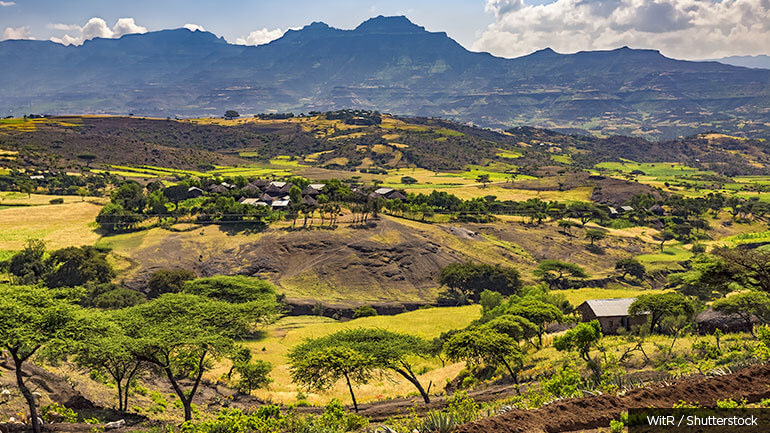
Context
Land degradation affects one in five people in Ethiopia. A lack of incentives for the adoption of sustainable land management practices, weak land tenure security, limited technical support and inadequate community participation have resulted in 80 percent of the country suffering from significant land degradation. The Government of Ethiopia (GoE) is committed to addressing these issues and is working with the World Bank and other development partners such as Germany, Norway, and Canada through the implementation of the Ethiopia Strategic Investment Framework (ESIF). This program scales-up the current SLM investments and for the first time, will include protected areas in the target area for conservation and sustainable use of natural resources and biodiversity (consistent with the ESIF).
Approach
PROGREEN is co-financing the Second Resilient Livelihoods and Landscape Project (RLLP-II) in Ethiopia, collaborating with the Ministry of Agriculture (MoA) to enhance climate resilience, improve land productivity, and promote carbon storage. Key activities include developing a long-term conservation vision for protected areas, strengthening coordination among relevant management platforms, and exploring private sector investment in eco- and community-based tourism.
The project targets 47 climate-vulnerable watersheds, focusing on land restoration efforts, with PROGREEN directly supporting seven of these. By increasing access to diversified livelihood activities in selected rural areas, the initiative addresses critical challenges related to land and forest degradation and biodiversity loss, particularly in the forest and agricultural landscapes of South-West Ethiopia. This program aligns with the government’s priority to strengthen integrated protected area management and sustainable community livelihoods.
Results
Through PROGREEN’s support, significant progress has been made in reducing deforestation in high conservation value forests surrounding targeted protected areas. Prior to July 2023, the project team achieved considerable milestones despite ongoing conflict in different regions of the country, which delayed some activities. Major achievements included the establishment of seven woreda (district) steering committees and technical committees, 42 kebele (ward) watershed teams, and 42 community watershed teams, along with 42 grievance redressal mechanisms.
Multi-year development plans were approved for seven major watersheds in southwest Ethiopia and the Southern Nations, Nationalities, and Peoples’ region, covering an area of 105,000 hectares and focusing on participatory forest management and buffer zone development.
Since mid-2023, the project has facilitated the restoration of over 5,700 hectares of land and treated nearly 15,000 hectares with various soil and water conservation measures, empowering communities to lead landscape restoration efforts. Furthermore, the development of Green Corridor Guidelines has enabled the identification and establishment of 24 green corridors, fostering ecological connectivity.
A collaborative workshop with multiple stakeholders also initiated important dialogues with national and international partners, laying the groundwork for continued investment in sustainable land management and community development in the region.